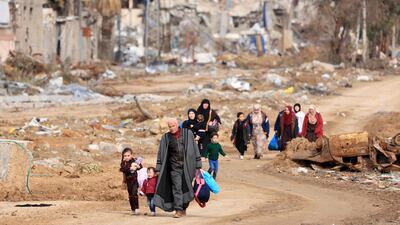The Israel-Gaza war has brought a second Nakba upon the Palestinian people, but it does not represent a tipping point for the Middle East in the same way that the first Nakba more than seven decades ago did for the wider region.
The ongoing war has displaced 2.3 million Palestinians, which is three times the number of people who were forced to flee their homes in 1948. More than 32,000 people have been killed in Gaza over the past nearly six months, which, according to some estimates, is more than double the casualty count in 1948. And yet the first Nakba was truly transformational in a way that the current tragedy is not.
To be sure, this conflict has its winners and losers – and it has already brought about some notable changes.
Hamas’s reign over Gaza appears to have ended indefinitely. It is very likely that the Israeli people will finally have the perfect alibi to get rid of Prime Minister Benjamin Netanyahu after the war. And the outpouring of international support for a free Palestine is both refreshing and welcome, although it might not last for long.
But these changes alone are not enough to usher in a new era in the decades-long Arab-Israeli conflict. They are not expected to make a huge dent in the stubborn Middle Eastern politics either. Parts of the region will remain unstable, with Israel and Iran being the major sources of instability. In short, don’t expect fundamental change after the dust has settled.

Israeli politics will continue to surge rightwards. Its brutal occupation will harden further with more annexations expected, as a majority of Israelis reject international calls for a two-state solution. The country will remain stubbornly defiant, refusing to learn the hard lessons from Hamas’s October 7 attacks.
The war has failed to bring together the Palestinian polity. One would have assumed that the ongoing disaster in Gaza would bring the leaders of Fatah and Hamas closer to one another. Not a chance. The gap between these two leading groups persists. Their divisions may even have widened and deepened.
The Arab world, meanwhile, has been unable to secure a ceasefire. Israel is largely dismissive of Arab concerns, as it has been systematically for the past seven decades. Surprisingly, the Arab street has remained relatively quiet. While we see weekly protests in solidarity with Palestine in some western capitals, such demonstrations are rare in Arab cities.
Meanwhile, the war proves that Iran intends to remain a regional spoiler. Tehran is exploiting the misery in Gaza to acquire legitimacy and popularity at the expense of moderate Arab states in the region. On balance, it is neither a winner nor a loser as a result of the conflict. Even if Hamas is eventually defeated militarily, Tehran is buoyed by the fact that the Houthis are taking on a superpower like the US in the Red Sea. In other words, the war has not changed Iran’s regional behaviour.
It is also worth pointing out that the war has not impeded the wider region’s momentum towards de-escalation. Detente remains the focus for a number of countries. The mood for conversation over confrontation prevails. For example, despite their differences over the war itself, Iran and the six Gulf countries are still talking to one another.
Finally, the war has hardly changed the US’s commitment to Israeli security. Occasional differences over policy choices are not new. Additionally, Middle East centrality to American politics has been reaffirmed.
Washington is seen to be engaging with the region, with one notable change being the Biden administration’s interest in creating a “Saudi-centred Middle East” in return for Riyadh establishing ties with Israel. This is happening even as anti-American sentiment is on the rise throughout the region as an outcome of the US’s support for Israel in the war. Washington is no stranger to anti-American sentiments, they fluctuate quickly.
None of this is to say that the Gaza war is not tragic on a massive scale, but it is hardly transformational. It will not bring about a sea change in the Middle East’s geopolitical status quo. It will certainly go down in history as a conflict that the International Court of Justice characterised as a “plausible” genocide, and which – tellingly – the world didn’t do enough to end. This, then, means that – unfortunately – it is likely to be forgotten beyond the region within a few short years.









